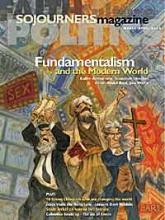From his fifth-floor window in Mennonite Central Committee's D.C. office, Daryl Byler can keep an eye on the Supreme Court while he takes calls from a press that since Sept. 11 has been scrambling for sidebars about pacifists. Reporters want theology briefings, history lessons, or alternatives to bombing; and there's the occasional interviewer who hauls out the old Niebuhrian indictment: Pacifists are "parasites on the sins of others." To which Byler replies with a grin, "I belong to a church that's been doing preventative defense for years. And, you know, with $21 trillion spent on this country's military since World War II, never has the government sent us a check for our work."
Mennonites—and their historic peace church fellows, the Brethren and Friends—were doing the work of homeland security long before it became a household phrase, pioneering Victim-Offender Reconciliation Programs, founding Christian Peacemaker Teams, establishing Mennonite Central Committee, Heifer International, and American Friends Service Committee. For all their acronyms, the U.S. peace churches don't have a corner on committees, nor on nonviolence; but post-Sept. 11, what they have to offer the media and the mainstream churches is a centuries-old peace theology that's rooted in Christ and community.
The Sermon on the Mount is for now, not later, the peace churches say, and the reign of God is already here (Luke 17:20-21). The task of the church, then, is to witness to the kingdom, to let the world know it's been reconciled (2 Corinthians 5:17-20) by creating a culture that creatively and nonviolently confronts evil, makes peace, and seeks justice.
Read the Full Article
